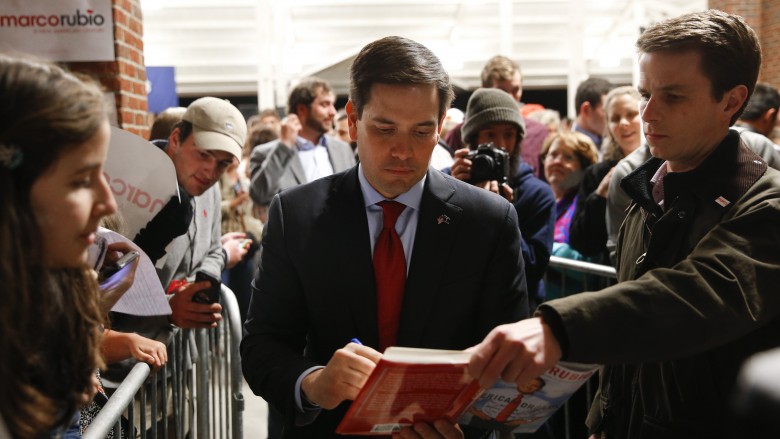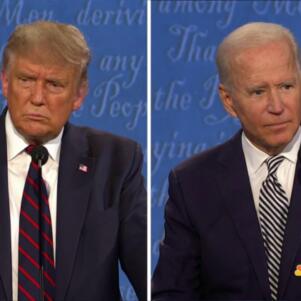The GOP moves to South Carolina, the first red state battleground
By David Woodard | February 20, 2016, 10:05 EST
 Republican presidential candidate Sen. Marco Rubio, R-Fla., signs his book at Clemson University during a campaign stop, Friday, Feb. 19, 2016 in Clemson, S.C. (AP Photo/Paul Sancya)
Republican presidential candidate Sen. Marco Rubio, R-Fla., signs his book at Clemson University during a campaign stop, Friday, Feb. 19, 2016 in Clemson, S.C. (AP Photo/Paul Sancya) Saturday’s Republican primary in South Carolina looks likely to boost the state’s reputation as a hard-fought political battleground.
The best description of Palmetto State politics came from James L. Petigru, a politician who in 1860 declared that “South Carolina is too small to be a republic, and too large to be an insane asylum.” Things have changed since that characterization, but it still captures the passion and impulse of the place.
The political division in South Carolina breaks along a line that divides the “low country” of Charleston, with its privilege and past allegiance to Europe, from the “up country” of tradesmen and merchants, who once listened to the call for revolution from Virginia. The up country thought the low country haughty, and the lowlands saw the upstate as backward.
Regional animosity softened in the glow of Ronald Reagan’s Republican popularity. In 1980, the former California governor came to South Carolina and mangled the GOP field in the presidential primary, taking 54 percent of the vote – more than 20 points ahead of the runner-up. After Reagan’s victory that fall, party regulars bragged, telling the press, “We pick presidents.” South Carolina’s “First in the South” primary position became permanent, and it satisfied the state’s longing for prominence and visibility.
So which candidate will South Carolina’s Republicans pick on Saturday? The latest Clemson University Palmetto Poll, which I founded and oversee with fellow professor Bruce Ransom, shows Donald Trump leading, with Ted Cruz and Marco Rubio fighting for second. Our poll of 650 frequent voters also shows a close race for fourth between Jeb Bush and John Kasich.
A state that bleeds red
Former state Republican Party Chairman Henry McMaster boasted: “We hunt Democrats with dogs down here.”
The culture of the state remains something different from the Deep South picture of “moonlight and magnolias.” Politicians embrace a traditional southern value: the protection of local interests from government intrusion, especially those by the federal government.
Today, the GOP is the majority party in the state, owning six of seven congressional seats, the gubernatorial office, both U.S. Senate seats, and every statewide elective office, including attorney general and secretary of state, plus a majority in both houses of the state legislature.
In the 1970s, South Carolina had the highest percentage of a state’s native population still in residence as adults years later. Multinational companies and interstate highways have changed that in more recent decades, but the new arrivals seemed to adapt to the traditional ways rather quickly. The population might live for the present, with a host of international companies and worldwide imports, but their values remained embedded in what went before.
South Carolina has the only African-American Republican U.S. senator. Conservative to his core, Tim Scott garnered more votes in the 2014 general election than senior Senator Lindsey Graham or Governor Nikki Haley. Still a resident of Charleston, Scott likes to say, “My grandfather is 92 years old … he looks at South Carolina and he says, ‘Wow, what an amazing state.’“ In a century, South Carolina went from segregation to integration, manufacturing to international business and backwater politics to national leadership.
The “First in the South” designation means more than geography or race. South Carolina is a “base” Republican state. That means any winner in the presidential primary faces an energetic electorate full of questions and opinions. The victor must pacify them all, knowing that a win in S.C. can lead to the party nomination.
Picking presidents
That’s what happened to George H.W. “Poppy” Bush in 1988. He’d served as Ronald Reagan’s popular vice president, but finished third, behind Bob Dole and Pat Robertson, in the Iowa primary. The conventional wisdom at the time gave the South Carolina race to Robertson because of his “Christian Coalition” and organization advantages. That didn’t happen. Bush beat Dole by 28 points, and Robertson by even more. The veep then waltzed through that year’s “Super Tuesday” election to the nomination.
In 1992, with Bill Clinton nipping at his heels, the incumbent president clobbered upstart challenger Pat Robertson by 40 points in the South Carolina primary.
The state’s reputation as a guardian of conservative values, with an ability to pick a winner, stayed intact when in 1996 Bob Dole returned as an “establishment” candidate. The 2000 election featured a showdown between Texan George W. Bush and Arizona Senator John McCain. Bush desperately needed a win. He quoted Mark Twain as he began campaigning: “Reports of my death are greatly exaggerated.” The candidate reworked his campaign around his time as governor, “a leader with a record.” It worked, and Bush won the South Carolina primary by 11 points.
Few states embody the combination of social and economic conservatism to the degree of South Carolina, yet the voters always seemed to pick an establishment Republican winner. John McCain appeared as the GOP frontrunner in 2008, converted more to the Washington ways of the U.S. Senate than his opponent, Arkansas governor and Baptist minister Mike Huckabee. The preacher won 24 counties, 13 of them in the upstate, while McCain took the remaining 22 in the downstate and eked out a 3-point victory.
Between 1980 and 2008, South Carolina voted in six contested Republican presidential primaries, and picked the party nominee each time, and three presidents. It seemed like a good record, one worthy of the “We pick presidents” label, until 2012.
That year, Mitt Romney seemed to have the Republican nomination wrapped up after being awarded victories in the primary states of Iowa and New Hampshire. Upstart candidate Newt Gingrich, who won only one other primary state that election cycle, openly clashed with a television moderator in a debate. He subsequently outstripped the field on primary day, and conquered Romney 40 percent to 28 percent. The state didn’t pick the GOP nominee that year because a one week quarrel over Gingrich’s personal life shifted voter attention away from national issues.
Not so establishment
A Clemson University polls finds Trump leading in South Carolina.
What does it look like in 2016? At a rally outside Clemson, South Carolina last week, a middle-aged woman appeared in a red, white and blue sequined miniskirt with her husband, who sported a sombrero and the words, “Donald Trump” emblazoned on the front. “We’re here to support an American hero,” she said.
Will Trump rule the day on Saturday as our poll predicts? Rubio has been endorsed by popular state politicians like Senator Tim Scott, Representative Trey Gowdy and Gov. Nikki Haley, but Ted Cruz has an effective “ground game” with lots of volunteers making phone calls across the state. Jeb Bush is struggling to keep up, and both John Kasich and Ben Carson are back in the pack. The press rumor is that John Kasich might beat Jeb Bush.
For the next few days at least, the state has reverted to Petigru’s asylum status. That’s how South Carolina goes about picking a president.











